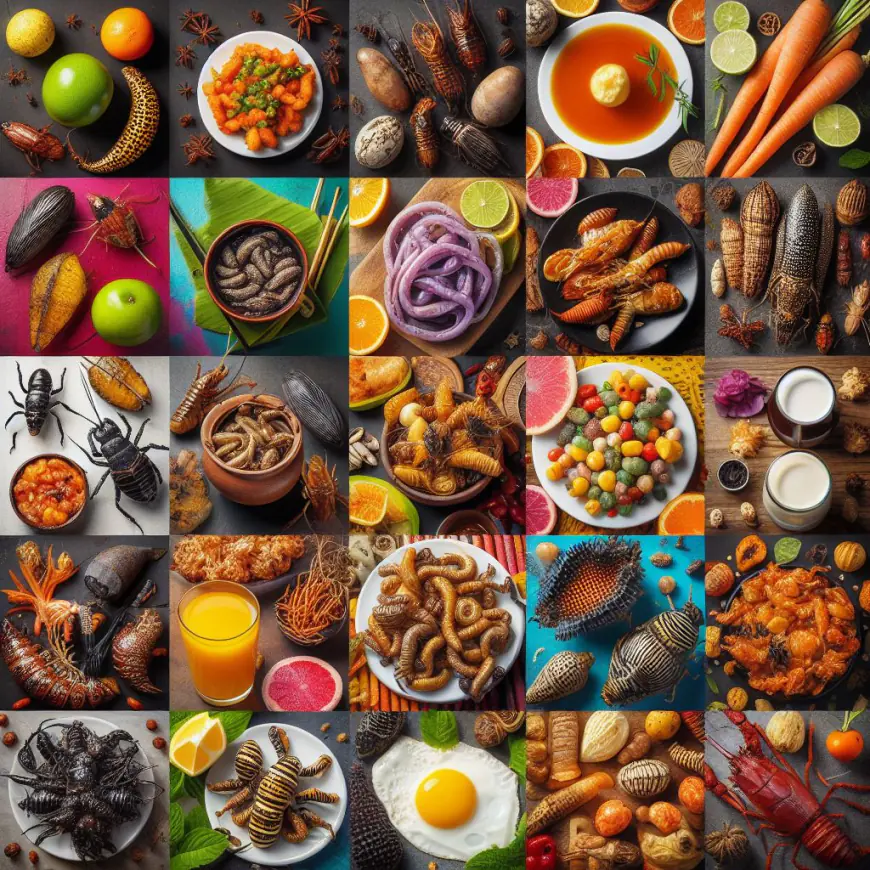Gastronomic Oddities: World’s Weirdest Eats
“Dive into the bizarre world of culinary wonders! Explore the strangest foods that defy norms and tantalize the adventurous palate.”

The Strangest Foods Around the World
Introduction
When it comes to food, what’s considered “normal” in one culture can be quite bizarre in another. The world is full of unusual delicacies that might surprise, shock, or even intrigue the adventurous eater. From the depths of the ocean to the heart of the jungle, people have found ways to turn the most unexpected ingredients into cuisine. In this article, we’ll take a culinary journey to discover some of the strangest foods from various corners of the globe.
Insects: A Crunchy Delicacy
Insects are not only a sustainable protein source but also a staple in many countries’ diets. In Thailand, fried crickets and silkworm larvae are sold as street food, offering a crunchy snack that’s rich in nutrients. Meanwhile, in Mexico, chapulines (grasshoppers) are seasoned with lime and chili and enjoyed as a savory treat.
Sea Surprises: Beyond Fish and Shrimp
The ocean hides many bizarre foods that are considered delicacies. Fugu, or pufferfish, is a Japanese dish that requires careful preparation to avoid its deadly toxins. In Iceland, hákarl—fermented shark meat—challenges even the bravest souls with its strong ammonia scent and acquired taste.
Offal Offerings: Organ-ic Eating
Offal, the organs of various animals, is a divisive food category. Scotland’s haggis—sheep’s heart, liver, and lungs minced with onion, oatmeal, and spices—is encased in the animal’s stomach and cooked. In the Philippines, balut—a developing duck embryo boiled and eaten from the shell—is a common street food known for its distinctive texture and flavor.
Fruits and Vegetables: Nature’s Oddities
Not all strange foods are animal-based. Southeast Asia’s durian is infamous for its pungent odor but loved for its creamy taste. The Ackee fruit from Jamaica can be deadly if eaten unripe, yet when prepared correctly, it’s a national delicacy, often served with saltfish.
Exotic Meats: Beyond the Farm
Moving away from the conventional chicken, beef, and pork, some cultures embrace a more exotic variety of meats. In Australia, kangaroo is a lean and healthy meat option that’s gaining popularity. In South Africa, biltong made from ostrich or kudu is a cherished snack. And let’s not forget the guinea pig, served roasted in many Andean societies.
Dairy Delights: Cheese That Crawls
Cheese is a beloved food worldwide, but some versions push the boundaries of what’s considered palatable. Casu marzu is a Sardinian cheese that’s literally alive with wriggling maggots. The fermentation process breaks down the cheese’s fats, resulting in a very soft, rich, and pungent product that’s eaten with the live larvae.
Fermented Fancies: Acquired Tastes
Fermentation is a time-honored method of preserving food, but it can lead to some peculiar products. Surströmming, a Swedish dish of fermented herring, is notorious for its strong odor. In Korea, hongeo is a type of fermented skate that’s known for its ammonia-like smell, similar to that of cleaning products.
Sweet Treats: Unusual Desserts
Desserts can be strange too. In the Philippines, halo-halo is a colorful mix of shaved ice, sweet beans, fruits, and ice cream. Japan offers wasabi ice cream, combining the heat of wasabi with the coolness of ice cream. And in Italy, gelato al carbone—charcoal gelato—is not only striking in appearance but also believed to have detoxifying properties.
Rare Roots and Tubers: Earth’s Hidden Gems
Beneath the soil, some of the most unusual edibles are waiting to be discovered. In the Andes, oca tubers come in bright colors and have a tangy flavor that turns sweet when baked. The lotus root, with its distinctive holey appearance, is a crunchy addition to Asian dishes. And then there’s cassava, which can be toxic if not prepared correctly but is a staple in many tropical diets.
Drinks and Potions: Sipping the Unusual
When it comes to beverages, some traditional drinks might seem quite peculiar. In Mongolia, fermented mare’s milk called airag is a celebratory drink. The egg coffee from Vietnam, where a raw egg is beaten with coffee, is surprisingly rich and creamy. And in some parts of the world, snake wine, infused with whole snakes, is believed to have healing properties.
Culinary Curiosities: The Art of Presentation
Sometimes, it’s not just the food itself that’s strange, but also the way it’s presented. In Japan, ikizukuri is the art of serving sashimi from a still-living fish. Edible dirt, made from various grains and herbs, is used in some avant-garde restaurants to add an earthy element to dishes.
The Future of Food: Innovations and Insects
As we look to the future, the definition of strange food may continue to evolve. With the rise of lab-grown meats and 3D-printed foods, what seems odd today might be commonplace tomorrow. Insects are also gaining ground as a sustainable food source, with cricket flour and mealworm burgers appearing on more menus worldwide.
Adventurous Eating: A Global Phenomenon
The quest for unusual foods isn’t just about taste—it’s about experience. It’s a way to connect with different cultures and to challenge our own culinary boundaries. Whether it’s a test of courage or a genuine love for the exotic, adventurous eating has become a global phenomenon, with travelers and foodies alike seeking out the most unusual dishes.
Final Thoughts
As we wrap up our exploration of the strangest foods in the world, it’s clear that what may seem bizarre to some is perfectly normal to others. These foods are a testament to human creativity and adaptability in cuisine. They invite us to broaden our horizons and to appreciate the diversity of flavors and textures that the world has to offer. So next time you encounter an odd food, take a moment to consider the history and culture behind it—you might just discover a new favorite.
Remember, food is not just sustenance; it’s an adventure, a story, and a bridge between cultures. Embrace the unusual, and let your palate travel the world.
What's Your Reaction?








































